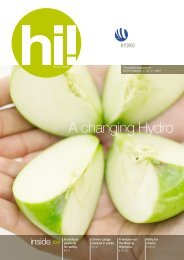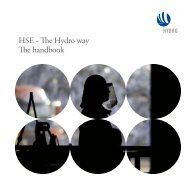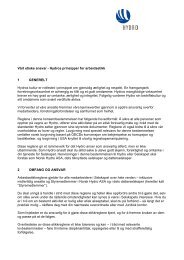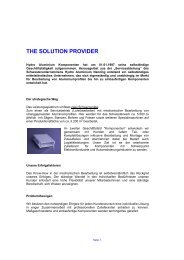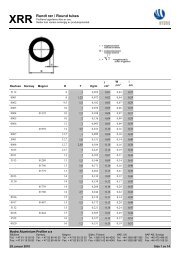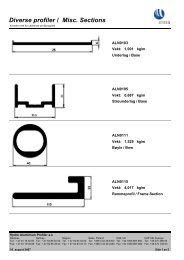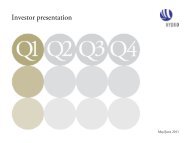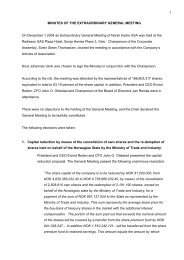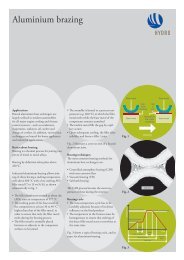Hydro Annual Report 2011b
Hydro Annual Report 2011b
Hydro Annual Report 2011b
You also want an ePaper? Increase the reach of your titles
YUMPU automatically turns print PDFs into web optimized ePapers that Google loves.
124<br />
CORPORATE GOVERNANCE<br />
Business planning and risk management<br />
The people process is designed to assess and develop our human resources, and is an integral part of our annual business<br />
planning. Its aim is to promote the potential of individual employees and of our organization as a whole.<br />
Risk management is also an integrated part of our planning and reporting process. Risk management deals with all aspects of<br />
value creation, including strategy, finance, commercial matters, organization, HSE, reputation, corporate responsibility,<br />
regulatory and legal matters. <strong>Hydro</strong>'s board of directors regularly reviews and evaluates the overall risk management systems<br />
and environment within <strong>Hydro</strong>. We carry out risk assessments for defined exposure areas. Exposure to certain risks, particularly<br />
those threatening life and health, has been consistently reduced to very low levels. See also page 131 for a more detailed<br />
discussion of <strong>Hydro</strong>'s financial risk management.<br />
Controls and procedures<br />
<strong>Hydro</strong>'s Internal Control over Financial <strong>Report</strong>ing (ICFR) framework is primarily designed to provide reasonable assurance to<br />
our management and the board of directors regarding the preparation and fair presentation of our Financial Statements.<br />
We established our comprehensive ICFR framework in 2006 and continue to maintain it based on the principles established by<br />
"The Committee of Sponsoring Organizations of the Treadway Commission (COSO) internal control - integrated<br />
framework." The five interrelated COSO principles are: Control Environment, Risk Assessment, Control Activities,<br />
Information and Communication, and Monitoring.<br />
Our overall control environment relevant for financial reporting is covered by <strong>Hydro</strong>-Wide Controls (HWC). HWC reflects<br />
the tone set by the common attitudes, ethics, and values, and competence of top management and management, and all the<br />
rest of our employees.<br />
Our ICFR model is implemented through a top-down and risk-based approach. Therefore, we emphasize four higher-risk<br />
areas: <strong>Hydro</strong>'s financial reporting risk, fraud risk, general computer risk, and financial closing risk.<br />
In addition, a standard and minimum level of controls is required for all reporting units, documented in an internal control<br />
handbook.<br />
<strong>Hydro</strong>'s disclosure committee assists the CEO and the CFO in ensuring fairness, accuracy, completeness and timeliness of<br />
<strong>Hydro</strong>'s public reports and disclosures. The disclosure committee is an integral component of <strong>Hydro</strong>'s disclosure controls and<br />
procedures and assesses <strong>Hydro</strong>'s compliance initiatives pertaining to ICFR. The disclosure committee reports quarterly a<br />
summary of its activities to the audit committee.<br />
Through reporting from the disclosure committee and internal audit, the audit committee takes an active role in ensuring the<br />
effective and harmonized functioning of the ICFR framework. See page 131 and www.hydro.com/governance for additional<br />
details.



